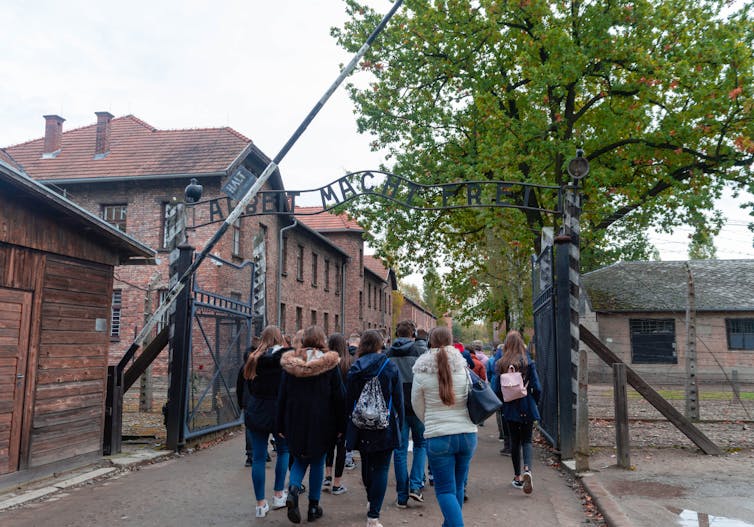Most UK adults don’t know key details of the Holocaust – how it has been taught in schools may explain why
By Blog Editor, IOE Digital, on 19 November 2021

Students visit the Auschwitz-Birkenau Memorial and Museum. Shanae Ennis-Melhado/Shutterstock
19 November 2021
By Rebecca Hale
A survey exploring knowledge of the Holocaust has exposed limited awareness in the UK of some of the most fundamental aspects of this history. Conducted by the Claims Conference, a non-profit organisation which secures compensation for Holocaust survivors, the survey was based on interviews with 2,000 randomly selected adults. Less than half of the respondents knew that six million Jewish people were killed and only one-quarter were aware of the meaning of “Kindertransport”, the rescue of children from Nazi territories.
I am a researcher at the UCL Centre for Holocaust Education and was a member of the taskforce for the Claims Conference United Kingdom Holocaust Knowledge and Awareness Study. My research explores teaching and learning about the Holocaust in English secondary schools.
Absence from schools
The lack of knowledge revealed by the survey is partly due to patchy school teaching of the Holocaust. Before the 1990s, Holocaust teaching and learning in the UK was neither widespread nor popular. Generations of children received little or no formal education about the Holocaust.
This had slowly begun to change in the 1980s, but the most significant development came in 1991 when the Holocaust became compulsory content in the national history curriculum in England for students aged 11-14 years. It has remained on the curriculum ever since. Although there is no such statutory requirement in Wales, Scotland and Northern Ireland, it is widely taught in these countries as well.
In theory, then, millions of adults aged 40-something and under should have studied the Holocaust as part of their secondary education. However, although the Holocaust has been on the curriculum for 30 years, this does not guarantee a solid education on the subject. Guidance on content, how it should be taught and to what end, has never been set out by the government.
This lack of clarity has affected how history teachers approach the Holocaust. A study by the UCL Centre for Holocaust Education found that history teachers in England were far more likely to focus on moral lessons from the Holocaust and developing students’ understanding of prejudice, racism and stereotyping – compared to a historical approach such as deepening their knowledge of the second world war and 20th-century history. While both approaches can be used, problems can occur when learning the historical details are not prioritised.
Superficial knowledge
A 2016 study of 10,000 students in English secondary schools showed that they had only superficial knowledge about the Holocaust and held significant misconceptions even when they had learned about it at school. For instance, 68% of pupils did not know what antisemitism is, and one-third greatly underestimated the number of Jewish people murdered. This suggests that an approach which prioritises learning moral lessons from the Holocaust is flawed. Key opportunities for students to develop profound understanding are missed.
Nuance is required when teaching about the Holocaust. For instance, while it is important to know that the UK took in nearly 10,000 Jewish children as part of the Kindertransport programme, we must also acknowledge the shortcomings of this operation. It happened before the outbreak of the second world war. It separated parents from their children, including infants. Not all children were treated well by their British hosts, and many experienced antisemitism in their communities.
Teaching these details in schools would show the complexity of this history and allow students – the adults of tomorrow – to grapple with significant ethical and political questions.
The survey by the Claims Conference adds to a growing body of evidence which demonstrates how vital it is for all young people to receive high quality and effective Holocaust education. For this to occur, teachers need to be supported to enable them to teach this complex history effectively and continue to develop their own historical knowledge.
For more than a decade, specialist organisations and initiatives, such as the UCL Centre for Holocaust Education’s Beacon School programme, have provided research-informed continued professional development for teachers. UCL’s latest research has found that this opportunity for teachers to continue learning is related to secure knowledge about the Holocaust.
Ultimately, knowledge of the Holocaust among teachers means students will build robust understandings of this history too. In turn, young people become able to identify and challenge misconceptions that are pervasive in society – such as those revealed by the Claims Conference study. This is especially important given the proliferation of fake news, misinformation and conspiracy theories that are widely circulated on social media.
The Holocaust lays bare the darkest recesses of human behaviour. Students must be equipped to recognise this truth and its complexities, in order to ask probing questions and reflect on what the Holocaust means in contemporary society.![]()
Rebecca Hale, Senior Research Fellow, UCL Centre for Holocaust Education, UCL
This article is republished from The Conversation under a Creative Commons license. Read the original article.
One Response to “Most UK adults don’t know key details of the Holocaust – how it has been taught in schools may explain why”
- 1
 Close
Close




Teaching about the Holocaust has been beset by a desire to heal the wounds of World War 2 and not to raise dislike of Germany and Germans. Nevertheless, perhaps because antisemitism is all too present in society, a salutary lesson could be learned through viewing, eg, the Pathe news film of the liberation of Bergen Belsen. The use of discussion to put this and, eg Kristalnacht into perspective should be a fundamental part of teaching about the Holocaust.